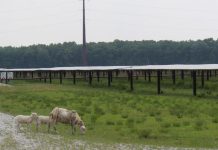Commentary: Dachau’s Lessons For Today
By John Krull
TheStatehouseFile.comÂ
DACHAU, Germany – The dead seem to whisper:
Do not forget.
It’s a clear cold day here at what was the Nazis’ first and longest operating concentration camp. I walk, my shoes crunching the gravel on the pathways, past and through the sites where people suffered and died.
I move first through the bunker where the prisoners slept. The wooden “bunks†are more like shelves, narrow ones at that. The bathrooms look just big enough to accommodate a high school basketball team, not the masses who were stuffed into Dachau.
This concentration camp opened just weeks after Adolf Hitler came to power in 1933. It was supposed to have a maximum capacity of 6,000 people.
It soon served as a prison for more than 30,000 people whose only crimes were worshipping in a different fashion, coming from a different place or living and loving in a different way. Despite the Nazi mania for cleanliness, disease and pestilence often swept through the overcrowded camp, in part because the Nazis didn’t bother to feed their prisoners well or keep them warm.
More than 200,000 people were imprisoned at Dachau.
More than 40,000 of them died here.
Their bodies were disposed of in a crematorium at a far corner of the camp. The Nazis hanged many of them from rafters right next to the ovens. Others the Nazis forced to kneel, then they killed the prisoners by firing single bullets into the back of the neck.
When the bodies of the dead were burned, their ashes were buried in mass graves, now marked as memorial sites.
It is at those memorials that the whispers seem the most urgent.
Do not forget.
As I stand at one of those memorials, I lift my gaze. The town of Dachau has grown and spread out since the last time I was here, nearly 35 years ago, but it still is a lovely, quiet place, a thriving suburb of Munich.
It is hard to imagine that such horrors could happen in such a seemingly normal place.
But that’s the thing about evil. In its way, it is like water. It finds any crack, over time widens that crack and then spreads where it will. What starts as a trickle becomes a flood.
And ends up in a place like this concentration camp.
Do not forget.
We like to reassure ourselves that what happened here at Dachau couldn’t happen now. We are too advanced. We know better.
But Germany was one of the most advanced countries in the world in the late 19th century and early 20th. Americans hungering for rigorous education traveled to study here. German culture, thought and art were at the front edge of human endeavor.
The street where Hitler lived when he began his climb to power, for example, also had served as home for Vladimir Lenin while he plotted to remodel the world and Mark Twain as he wrote “A Tramp Abroad†and part of “The Adventures of Huckleberry Finn.â€
The spot where Hitler launched the “beer putsch†that landed him in jail but made him into a folk hero is in a substantial part of Munich. Then as now, Munich was a lively, cultured city, not a backwater or a benighted place. Just a couple hundred steps from where human history took this tragic turn sits one storefront after another of high-end shops that rival those on Madison Avenue.
If evil could flower in Munich, it could flower anywhere.
Do not forget.
As he began his rise, sophisticated Germans treated Hitler as a joke. They called his squared-off mustache a “snot block.â€
But there were Germans threatened by their country’s sophistication, its acceptance of new ideas and differing lifestyles. They longed for simpler times. They feared “outsiders†and blamed them for any loss of status or well-being.
Hitler spoke to their fears.
He might not have made it, though, if many of Germany’s entrenched and wealthy establishment hadn’t thought they could use him to protect their interests and backed him.
It turned out that he couldn’t be used.
That he wasn’t a joke.
And tragedy followed.
Do not forget.
Darkness falls. The camp is closing.
As I walk away, the only sounds I hear are of the gravel’s crunch beneath my feet.
And the whispers of the dead.
FOOTNOTE: John Krull is director of Franklin College’s Pulliam School of Journalism and publisher of TheStatehouseFile.com, a news website powered by Franklin College journalism students.






